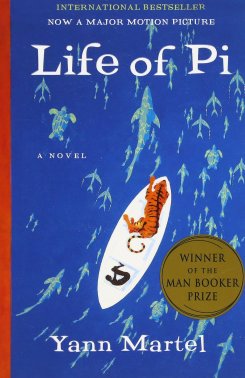I’ve been spending the last few weeks playing Persona 5 and sorting out some things, but in a leisurely moment one of those things has been catching Life of Pi with my library’s movie service. I have history with this book, as I first encountered it in my heartily rebellious atheist phase and fought valiantly against reading it. One of the best things about movies is the helplessness by which our eyeballs are glued to the screen. Unless the movie is absolute garbage (Ahem, Twilight) the silver screen has a hypnotizing effect, and as we authors hope for, a gateway effect to literature.

After watching Life of Pi, I decided to read the book, which had been languishing around our house as not one but two copies. One is a cherished, dog-eared volume with many pencil marks lightly sketched in it, bearing my wife’s name in the corner of one page. The other is a slick, almost brand-new paperback that shows no signs of my abandoned attempts to open it, nor the derision I lavished on its message. These two books have sat side on our shelves ever since my wife and I combined our prodigious book collections. I daresay they are symbolic of the exciting relationship my marriage has been the last few years.

Older and theoretically wiser, I finally managed to finish Life of Pi (my wife’s volume, naturally) and instead of reviewing what is now a cultural icon, this is more of a philosophical reflection on its message. The movie is beautiful, incidentally, faithfully recreated and nipped in just the right places to make it accessible as a visual medium. I must note that the colors and cinematography do the job of inspiring a numinous feeling. I am an atheist, but I have experienced the “idea of the holy” before. Coined by Rudolf Otto in 1917, the word “numinous” is a nice, rational, neutered way of describing the experience of faith. Spoilers etc follow:
Experience is an interesting word here. When I spoke about the book to someone, he described it as kind of a “kids’ book.” Considering the frank, practical approach to the cruelties of life and the potential interpretation of cannibalism and murder, that description threw me for a loop. I don’t think anybody can deny that Life of Pi is a moving story and one that examines some of the limits of what makes us human. To approach a story about inner fortitude and spiritualism as child’s play makes me think a lot of people are stunted in their inner growth.
But to be fair, Americans are not generally encouraged to study this sort of thing. Philosophy and comparative religion are the first subjects cut from university programs, because of the simple reason that they are not held in demand by profitable industries. In fact, if my old philosophy professors are any judge, they are actively seeking to undermine the quest for capitalism with such tawdry things as compassion, human decency, and overarching purpose. I have had a pervasive feeling for many years that Americans struggle to find common values in a diverse society and constantly face growing physical and psychological issues. We would have far less racism and far fewer shootings if people found value in more than currency. Like the ill-informed Indian students and teachers who called Piscine “Pissing” Patel, I am inclined to think Americans simply do not have the vocabulary to interpret LoP in any way other than a dismissive one, faithful or no.
As an atheist encountering this book for the first time, I reacted poorly to the message about spiritualism. From the first chapters, LoP is an uplifting piece of literature that embraces three separate faiths. It is a trio unique to India… at first glance. Mr. Patel joins the faiths of Christianity and Islam in addition to his native faith of Hinduism. But what I find missing is the obvious candidate in the equation, Buddhism, which had its roots in India. As a former Buddhist, I could not help but see that as both odd and unbalanced. Mr. Patel accepts the mystery of Christ’s sacrifice by God as something mysteriously alluring, accepts the Hindu practices inherently, and accepts Islam’s ritual prayer as comfort.
As an atheist, the odd trinity outright offended me. For me, the death of Christ is cruel and illogical, the Hindu ideas of reincarnation bolsters an inhumane caste system, and Islam’s rituals reinforce a sense of superiority over infidels. None of these things even came close to Buddha’s peace and equality, nor the freedom afforded by practical philosophy. It is without irony that Yan Martel associates science and Hinduism as two ways to practice faith. It is with dripping irony that Mr. Patel’s atheist father is the one who makes peace and buys everybody ice cream when Mr. Patel’s three religious mentors came together in one scene. And it is with supreme gall that Mr. Patel simultaneously abandons his tenets and praises the god that cast him out to sea with a tiger for company.
I almost thought of this book as a treatise against religion as a human creation. That it is only as useful to us in times of great need, as far as it suits us, and that God is a story we tell when the truth is too hard to bear. Near the end of the book, Mr. Patel asks his inquisitors which is the story they prefer to hear. We are led to believe the one with the tiger is the better one. “So it is with God,” Piscine says, as if we should accept this as reason enough, wisdom for the ages. The younger me would have preferred the one with the cannibalism and murder.
But when my wife and I spoke about LoP, I found myself reiterating much of what I’ve said here, and adamantly insisting that BOTH stories are necessary. As Mr. Patel insists, neither is of much use on a practical level to his Japanese inquisitors. Neither are they of use to the theologian or philosopher. But together, knowing both the pleasing and the horrifying, there is meaning to be found. Only when you photoshop a tiger and a bunch of bananas over the worst bits of these stories do you have the book Life of Pi, which has charmed millions the world over and inspired a lovely, thought-provoking film. If you took away the horrorshow at the ending, the book would be fantasy only, entertaining but implausible. But remove the pretty fantasies, and you would have a memoir, a terrible account that can be found in any history book and has never inspired others to do better. How easy is it to doubt the veracity of a thing that comes from someone’s lips? But put those two together, and you have something that resists attempts to devalue or falsify. The story of gods isn’t supposed to be true. It is supposed to have the power of fiction, which has always been the power to imagine something better than what we have.
So it is with God, I think.
